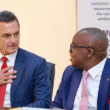On 30th March 2022, the European Union (EU) Delegation to Tanzania together with the European Business Group (EUBG) presented the report “EU Investment in Tanzania: How European investment contributes to industrialization and development in Tanzania.”
The report highlights the scope, scale, and reach of investments from the EU in Tanzania, showcasing their impact on the national economy, as well as trends and opportunities for further investments.
As part of the study, 11 key sectors of the economy are mapped in detail, highlighting the outlook, opportunities, and challenges for investors.
It has a specific focus on developments that have taken place in the past five years, mapping in detail eleven key sectors of the economy: agriculture; banking and finance; construction and real estate; energy; information, communication and technology (ICT); manufacturing; mining; retail and trade; transport and logistics; tourism; as well as oil and gas.
Presenting the report, the EU Ambassador to Tanzania Manfredo Fanti noted that “This report has been prepared with two objectives. Firstly, to showcase the positive contribution of EU investors to the Tanzanian economy and present the many opportunities that Tanzania and East Africa offer for additional investments. The second objective is to provide a tool to economic diplomacy at a time when European investors are showing a renewed interest in Tanzania and the country is actively seeking new partners to develop and diversify the national economy.”
Key Figures
The EU is a strong and reliable trade partner to Tanzania, with the EU being the destination for 8% of Tanzania’s total exports and providing 10.2% of total imports.
In recent years, Tanzanian exports to the EU were dominated by food, including livestock, followed by beverages, tobacco, and crude materials.
EU exports to Tanzania were dominated by machinery, transport equipment, and chemicals.
In 2021, Tanzanian exports to the EU amounted to EUR 456m while imports from the EU amounted to EUR 856m.
The EU is also a significant contributor to foreign direct investment (FDI). FDI flows into Tanzania from the ten most active EU Member States into Tanzania was USD 1.5b between 2013–2020.
Nevertheless, in recent years there has been a drop in EU investment figures, representing the exit of the UK from the EU and a broader decline in Tanzania’s appeal as an investment destination, in large part caused by an increasingly challenging regulatory and fiscal landscape.
The trends of EU FDI in the country broadly follow the global trend of FDI heading to Tanzania. Recent optimism, largely driven by President Samia Suluhu Hassan’s commitment to fostering a more conducive business environment is expected to give a new impulse to FDI.
EU companies and investors continue to register new projects in Tanzania as captured by data collected from the TIC. Between 2016 and 2020, EU companies registered 115 new projects with the Tanzania Investment Centre (TIC). The total size of these EU projects was USD 471.9m.
The size of the investment was, however, quite limited with 51% of respondents reporting a turnover of less than EUR 1m, 41% reporting a turnover of less than EUR 10m, and 8% more than EUR 10m.
Business Environment & Investment Climate
Since 2015, Tanzania saw a marked decrease in investment with FDI flows dropping by one-third and the number of new businesses registering in Tanzania dropping by a similar amount, reflecting the real and perceived challenges of conducting business in the country.
As per the Tanzanian Government’s own Blueprint for Regulatory Reform to improve Business Environment, there is room for improvement, in particular in areas relating to starting a business, paying taxes, and trading across borders.
Recent efforts by the Government to improve the country’s business environment also aim at enhancing the inflow of investments.
Over-regulation of some key sectors continues to be a source of frustration among investors, and many companies have faced challenges with the Tanzania Revenue Authority’s (TRA) efforts to increase tax collection.
This perception, among other dynamics, has contributed to a slowdown of FDIs in Tanzania in recent years, dropping from 3.2% of the GDP in 2015 to 1.8% in 2018.
Looking Ahead
In her government priorities, President Samia Suluhu Hassan has included reforms to foster a more conducive business environment.
Investors and potential investors alike are cautiously optimistic that these presidential statements will be translated into tangible actions over the short to mid-term.
Significant opportunities continue to exist for investment in Tanzania. However, the inflow of investment will largely depend on the ability of the current administration to create favorable conditions to attract and maintain investment.
The existence of an independent and transparent judiciary framework, an aligned legislative framework, and a level playing field for international investors are important components of any conducive business environment.
Key concerns raised throughout the data collection process included the efficiencies around TRA’s revenue collection mandate, the ability of the Government to streamline processes, and the need for stakeholder consultation when legislation and regulations are being reformed.
On the other hand, investors will need to show a genuine commitment to work with the Government in achieving its strategic goals as set out in the National Five-Year Development Plan and the annual budgets.
The presentation event was attended by European Union (EU) Member States Ambassadors, representatives from the Government, and from the private sector.
Commenting on the report on behalf of Tanzania’s Prime Minister Kassim Majaliwa, the Minister of Foreign Affairs and East African Cooperation, Hon. Amb. Liberata Mulamula said: “This report is positively received and it will be used to add value to the ongoing business environment conversations and it will be a useful tool for dialogue and collaboration. It is satisfying to note that the Report has acknowledged the personal commitment of the President and that of her Government in ensuring the investment and business environment in the country is improved. The Report has also acknowledged the various efforts that the Government has taken to improve investment and business climate.”











